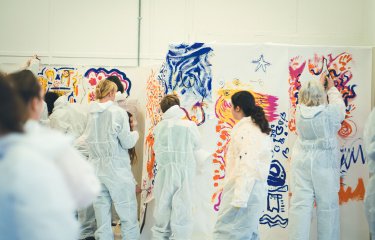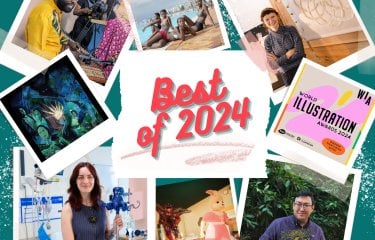Changing fashion for the better: In conversation with lecturer Tom Crisp
11 May 2022

Tom Crisp is a menswear designer, trend analyst and fashion lecturer, and has just been appointed as course leader for Falmouth’s radical new online master’s course in Sustainable Fashion. He shares how his deep and varied industry knowledge, and a strong commitment to championing regenerative practices, will help to build the conscious mindsets needed to change the fashion industry for the better.
Tom is no stranger to the fashion industry, or to online learning at Falmouth. His journey began when studying menswear design at Ravensbourne and the Royal College of Art, before landing design roles at several internationally renowned labels and brands. He then obtained a higher education teaching and learning qualification and went on to lecture at the London College of Fashion and Norwich University of the Arts. In 2020 he joined Falmouth as a learning designer, helping to develop the online learning environment, and so in leading the online MA in Sustainable Fashion, his knowledge and experiences will unite.
So, what first raised Tom’s awareness of the sustainability challenges facing the fashion industry? “I felt a sense of disillusionment. I started to ask myself questions like ‘what are we doing?’ and ‘why are we creating all these products?’ I began to realise it wasn’t quite the creative industry that I thought it was going to be, and it really spurred me on to think about ways of doing things differently.”
“I have had the opportunity to experience the fashion industry from many different viewpoints, from design and education to trend forecasting, and all those viewpoints together have really enriched my understanding of the sector and where it needs to go. We need to give the industry a new lease of life that doesn't damage the planet and the wonderful people that work within the industry.”
With an unwavering focus on regenerative practice, thinking differently about fashion is at the core of this unique course. “We’re one of the only courses in the country that has the title of ‘sustainable fashion’, and we will be engaging the students in understanding what sustainability means to them, and really figuring out how we can change the paradigms that we've been working in.”
“Fashion has a long history of extracting raw materials from the planet, with all the industry’s processes built to consume more and more product. This course really tries to flip that narrative, by considering ways we can develop a fashion industry that uses circular and regenerative processes. We call this the ‘conscious mindset’.”
There are many benefits to online study, and in the case of MA Sustainable Fashion, the global perspectives that will be generated through being part of an international cohort will enhance the experience for all involved.
“Being an online international course, we will consider global problems, but we will also look at how you can take ideas from a global perspective and apply them to local communities. Students will explore the systems around them and look at how people in their communities interact with fashion, and what products are being produced there, crafting conscious, ethical, and sustainable solutions to the problems encountered.”
While the course is delivered online, it has been developed within Falmouth’s acclaimed Fashion & Textiles Institute, and will build on a legacy of fashion innovation, entrepreneurship and collaboration. The course is not a traditional maker course, but instead will empower fashion practitioners to influence the future of the fashion system.
Fashion has a long history of extracting raw materials from the planet, with all the industry’s processes built to consume more and more product. This course really tries to flip that narrative.
As Tom explains: “We are looking for motivated students who have an idea of where they want to go within sustainable fashion. They may have their own business or be part of a global brand. We’re entrepreneurially focused, so we want students to come in and develop their own vision of the future. That’s the good thing about it being part time; with the ability to work alongside studying, the course can support the development of sustainable practices in a student’s business or workplace through direct application of those learnings. And from there we will build a network of industry partners to develop future projects and collaborations.”
With further experience in trend forecasting and analytics, Tom holds a wealth of expertise in this key area of the fashion industry. So how does he think trends can and should operate within the context of sustainable fashion?
“Trends increase consumerism by artificially creating a need for new products, which does not chime with the regenerative approach needed to increase sustainability in the industry. We need to lessen the trend cycle, because it perpetuates the need for continual product. This has been accelerated by streetwear, with its regular drops throughout the year, and by influencers and their hauls, unboxing thousands of pounds' worth of clothing promoting constant newness. There needs to be a slowing down of those trends, an embrace of slow trends and a refocus on what brings people joy.”
This positivity is central to the design of the course, which has been created to empower changemakers to challenge existing industry practices through ethical and inclusive change, and Tom is particularly enthused by the discussions the future cohorts will have.
“It’s hopefully going to attract a diverse set of people with interesting ways of looking at how fashion can move forward, so I think there's going to be a lot of very rich conversation. In one of the modules, we place the students in the year 2040, and ask them to imagine what a positive future for fashion will look like, and to develop those optimistic narratives.”
“We want students to take up their own unique roles in changing the fashion industry for the better. To think ‘OK, that's my direction. Now how do I make that a reality?’ I’m excited to help them realise those realities.”







